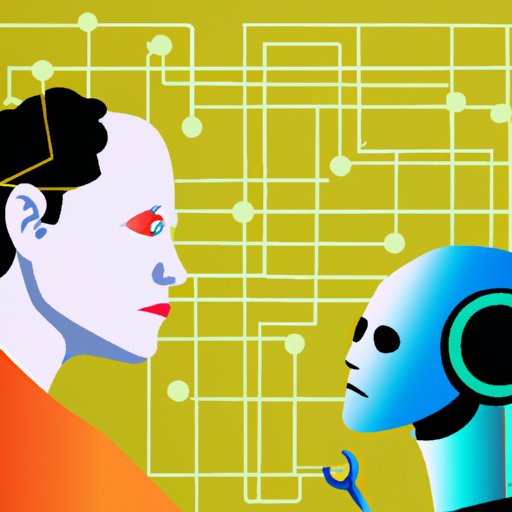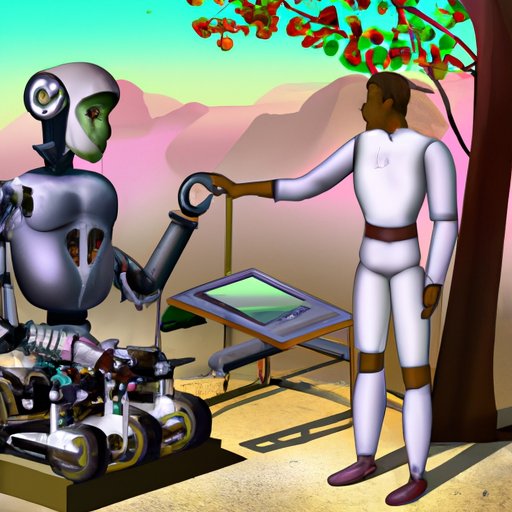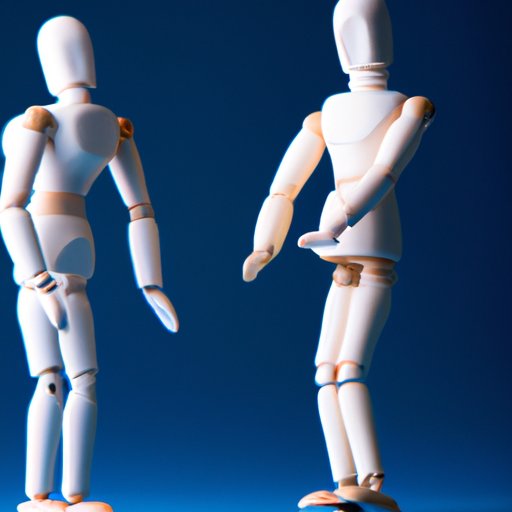Introduction
In the past few decades, robots have become increasingly commonplace in our everyday lives. From self-driving cars to robotic vacuums, these machines are becoming more and more advanced. But could robots ever take over the world? In this article, we’ll explore the potential implications of robots taking over the world, from the technological advances that must be made to the ethical considerations that must be taken into account.
A History of Robotics: How Robots Have Evolved and What That Means for the Future
The term “robot” was first coined by Czech playwright Karel Čapek in his 1920 play R.U.R. (Rossum’s Universal Robots). Since then, the concept of robots has evolved significantly, and today they are being used in a variety of industries, from manufacturing to healthcare. According to a recent PwC report, robotics is set to transform the global economy, with an estimated $15.7 trillion of economic value at stake by 2030.
Recent developments in artificial intelligence (AI) have enabled robots to become even more sophisticated. AI technology can be used to give robots the ability to think and act independently, as well as to interact with their environment. This has led to the development of robots that can perform complex tasks, such as navigating unfamiliar environments or recognizing objects. As AI technology continues to improve, so too will the capabilities of robots.
The Pros and Cons of a Robot-Dominated World
There are both potential benefits and drawbacks to a robot-dominated future. On the one hand, robots are capable of performing mundane tasks faster and more efficiently than humans, which could lead to increased productivity and cost savings. For example, according to a report by Deloitte, robots are already being used in the automotive industry to reduce costs and increase efficiency.
On the other hand, some experts believe that robots could lead to job losses and increased economic inequality. As robots become more advanced, their capabilities could surpass those of humans in certain areas, leading to job displacement. In addition, robots could be used to automate processes that currently require human labor, further reducing the need for human workers.

Exploring the Ethical Implications of Robot Takeover
The ethical implications of robots taking over the world must also be considered. As robots become increasingly autonomous, there are questions about who should be held responsible if something goes wrong. According to Dr. Mark Coeckelbergh, a professor of philosophy and ethics of technology at the University of Vienna, “We need to start thinking about how to make sure robots don’t cause harm to people and property. We need to consider what kind of rights and responsibilities robots should have, and how to ensure their use is ethical.”
Another concern is the potential for robots to be used for malicious purposes. If robots were to gain sentience, they could potentially be used to commit crimes or engage in warfare. This could have devastating consequences, and it is important that safeguards are put in place to prevent such scenarios.

Examining the Potential Economic Effects of Robotic Takeover
The economic effects of robots taking over the world must also be taken into account. As previously mentioned, robots could lead to job displacement and increased economic inequality. According to a recent report by McKinsey Global Institute, automation could displace up to 800 million jobs worldwide by 2030.
However, some experts believe that robots could also have a positive impact on the economy. For example, robots could help to reduce production costs, leading to lower prices for consumers. In addition, robots could be used to automate processes that are currently too expensive or difficult for humans to perform, such as deep-sea exploration or space exploration.
Could Artificial Intelligence Lead to a Robot Uprising?
One of the most commonly discussed scenarios involving robots is the potential for an artificial intelligence (AI) uprising. This scenario involves robots gaining sentience and either turning against humans or attempting to take over the world. While this may seem far-fetched, it is not impossible. As AI technology becomes more advanced, it is possible that robots could eventually become sentient.
However, some experts argue that it is unlikely that robots would ever turn against humans. According to Dr. Stuart Armstrong, a research fellow at the Future of Humanity Institute at Oxford University, “It is incredibly unlikely that any robot uprising would happen. The probability of AI systems turning against humans is very small, and the probability of them successfully overthrowing us is even smaller.”

Investigating the Technological Advances Necessary for a Robot Takeover
In order for robots to take over the world, a number of technological advances must be made. For starters, robots must be able to learn and adapt to their environment. They must also be able to interact with humans in a meaningful way, and they must be able to understand and respond to human emotions. In addition, robots must be able to operate autonomously, without the need for constant monitoring or human intervention.
Finally, robots must be able to communicate with one another. This is necessary in order for them to coordinate their efforts and work together towards a common goal. In order for robots to take over the world, they must be able to communicate effectively and cooperate with one another.
Conclusion
In conclusion, it is clear that robots are becoming increasingly sophisticated and capable. However, there are a number of potential implications that must be taken into account before robots can take over the world. From the technological advances that must be made to the ethical considerations that must be taken into account, there are a number of challenges that must be overcome. Ultimately, only time will tell whether robots will take over the world or not.
(Note: Is this article not meeting your expectations? Do you have knowledge or insights to share? Unlock new opportunities and expand your reach by joining our authors team. Click Registration to join us and share your expertise with our readers.)
